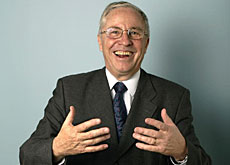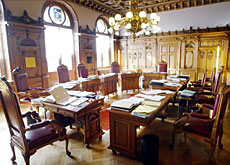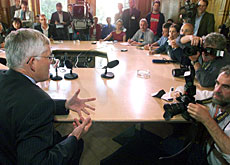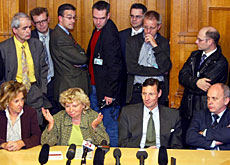Blocher wins seat in cabinet

Christoph Blocher, the populist figurehead of the rightwing Swiss People’s Party, has won a seat in government.
By a narrow majority of five parliamentary votes, Blocher successfully unseated the Christian Democrat justice minister, Ruth Metzler.
Every four years, shortly after the parliamentary elections, cabinet ministers need to have their mandate renewed by parliament.
They normally have little trouble being re-elected, but after its gains in October’s parliamentary elections, the People’s Party renewed its calls for a second seat in government.
Blocher’s challenge has thrown a normally predictable election process into confusion, with several scenarios possible.
Sacrifice
There is general agreement among the four main political parties that the People’s Party should have a second cabinet seat.
But it could only be at the expense of one of the other parties in government – all of which have two seats – and none of them has so far proved willing to sacrifice a seat.
Both centre-right Christian Democrat ministers – Ruth Metzler and Joseph Deiss – have refused to stand down.
They became the main target for Blocher after their party’s poor showing in October’s parliamentary elections.
The centre-left Social Democrats have categorically refused to vote for Blocher, maintaining he is an unacceptable candidate, and their parliamentarians are expected to vote for both Metzler and Deiss.
But the Social Democrats’ intransigence could backfire on the party. Should Blocher fail in his attempt to unseat either of the Christian Democrats, he says he will stand against one of the two Social Democrat ministers – Micheline Calmy-Rey.
The Radicals are the People’s Party’s closest allies in parliament and have already said they will support Blocher in his bid to deselect one of the Christian Democrats.
Close call
Neither of the main political blocs in parliament for the purposes of this election – People’s Party/Radicals or Christian Democrats/Social Democrats/Greens – can command a majority, making Blocher’s bid for a seat a close call.
There is no guarantee that individual parliamentarians will toe the party line as the vote is by secret ballot. The outcome could hinge on how some of the smaller parties vote, as well as how successful the four main political parties are in ensuring their parliamentarians follow the party recommendation.
The order of voting will also play a large part in the result, and all the parties maintain they want to complete the election process on Wednesday, rather than prolonging it for another week.
Blocher’s chances of being voted into government are put at fifty-fifty by many political pundits.
There has been much speculation in recent weeks as to whether the People’s Party will carry out its threat to go into opposition if Blocher fails in his bid for a seat, especially if parliament elects an alternative candidate from his party.
swissinfo, Jonathan Summerton
Every four years, shortly after parliamentary elections, cabinet ministers wishing to remain in office need to have their mandate renewed by parliament.
In October’s elections the People’s Party received 26.6% of the vote, the Social Democrats 23.3%, the Radicals 17.3% and the Christian Democrats 14.4%.
Immediately after the election the People’s Party demanded a second seat in the cabinet for Christoph Blocher.
There are 246 members of parliament, with 124 votes required for an absolute majority.
Neither of the main political blocs – People’s Party/Radicals or Christian Democrats/Social Democrats/Greens – can command a majority in Parliament.
Since 1959, an informal power-sharing arrangement, known as the “Magic Formula”, has shared out cabinet seats among Switzerland’s four main political parties.
Under the agreement the Social Democrats, the Radicals and the Christian Democrats each have two seats, the People’s Party one.

In compliance with the JTI standards
More: SWI swissinfo.ch certified by the Journalism Trust Initiative



You can find an overview of ongoing debates with our journalists here. Please join us!
If you want to start a conversation about a topic raised in this article or want to report factual errors, email us at english@swissinfo.ch.